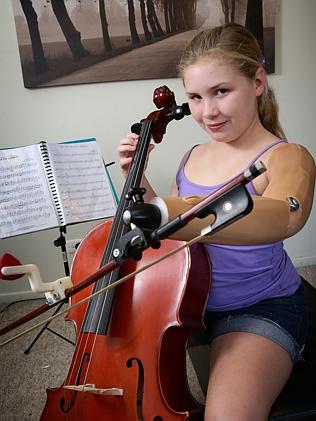
Chloe rust was born without part of her left arm. But that has not stopped her from learning the cello. Picture: Liam Kidston. Source: News Limited
AN 11-year-old Brisbane girl who was born without most of her left arm has fulfilled a dream to learn the cello with help from some dedicated medical engineers.
After failed attempts with the violin, Chloe Crust switched to the cello about four years ago, deftly manoeuvring the bow with her fibreglass prosthetic arm, using a special attachment imported from the US.
“Chloe has taken to it like a duck to water,’’ her mother, Megan, said.
“She’s very resilient. She gives everything a go. She’s always been like that.”
The Year 6 student, who forms part of The Gap’s Hilder Road State School chamber strings orchestra, has passed the Australian Music Examination Board’s Grade 1 exam for cello. But to advance further, she needed to be able to pluck the strings.
That’s when medical engineer Oliver Mason, from the Royal Brisbane and Women’s Hospital Rehabilitation Engineering Centre, became involved. He custom-made a device that attaches to Chloe’s bow, allowing her to pluck the strings with her prosthetic arm.
US scientists have developed a brain-controlled robotic arm for the disabled.
YOUTUBE: Classic music ensemble Aston post tribute to Game of Thrones
TRUMPET: Autism won’t hold Garrett back as he finds his voice through music
IMPROVISATION: Not-so-mellow cello highlighted at Adelaide’s international festival
The device can be flipped out of the way quickly so Chloe can return to playing the strings with her bow.
“It’s pretty cool,” Mr Mason said. “She was very excited.
“It doesn’t matter what’s going on in their lives, they’re still just kids.”
Mr Mason made a prototype out of metal and then approached the Queensland University of Technology medical engineering laboratory, which used a 3-D printer to replicate the device in plastic, weighing just 14 grams.
QUT medical engineer Melissa Johnston was happy to help.
“To produce something that can be used to help somebody, it’s a really nice feeling. It’s a lovely story,’’ she said.
Click here to donate to the RBWH Foundation, which helps fund the rehab engineering centre
